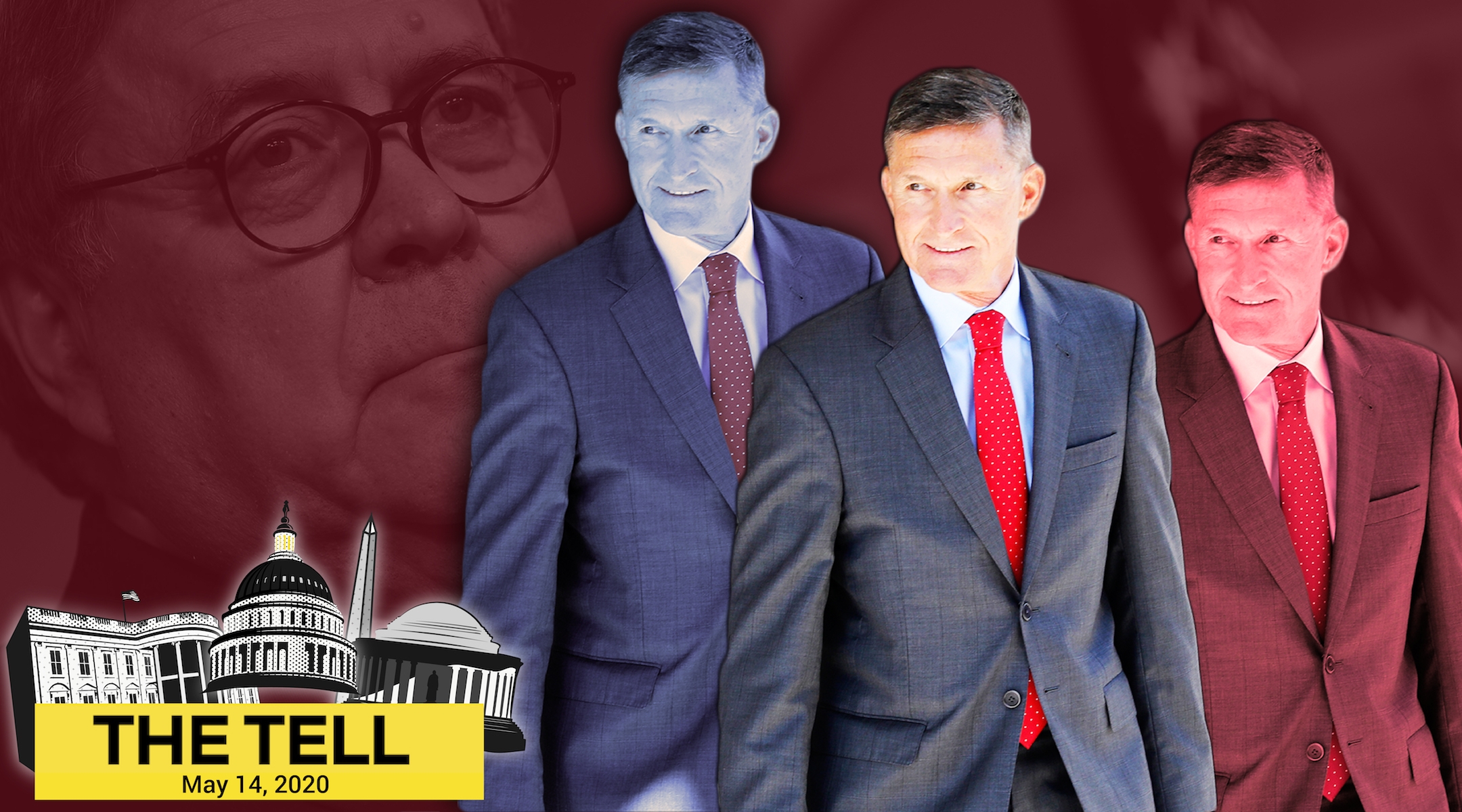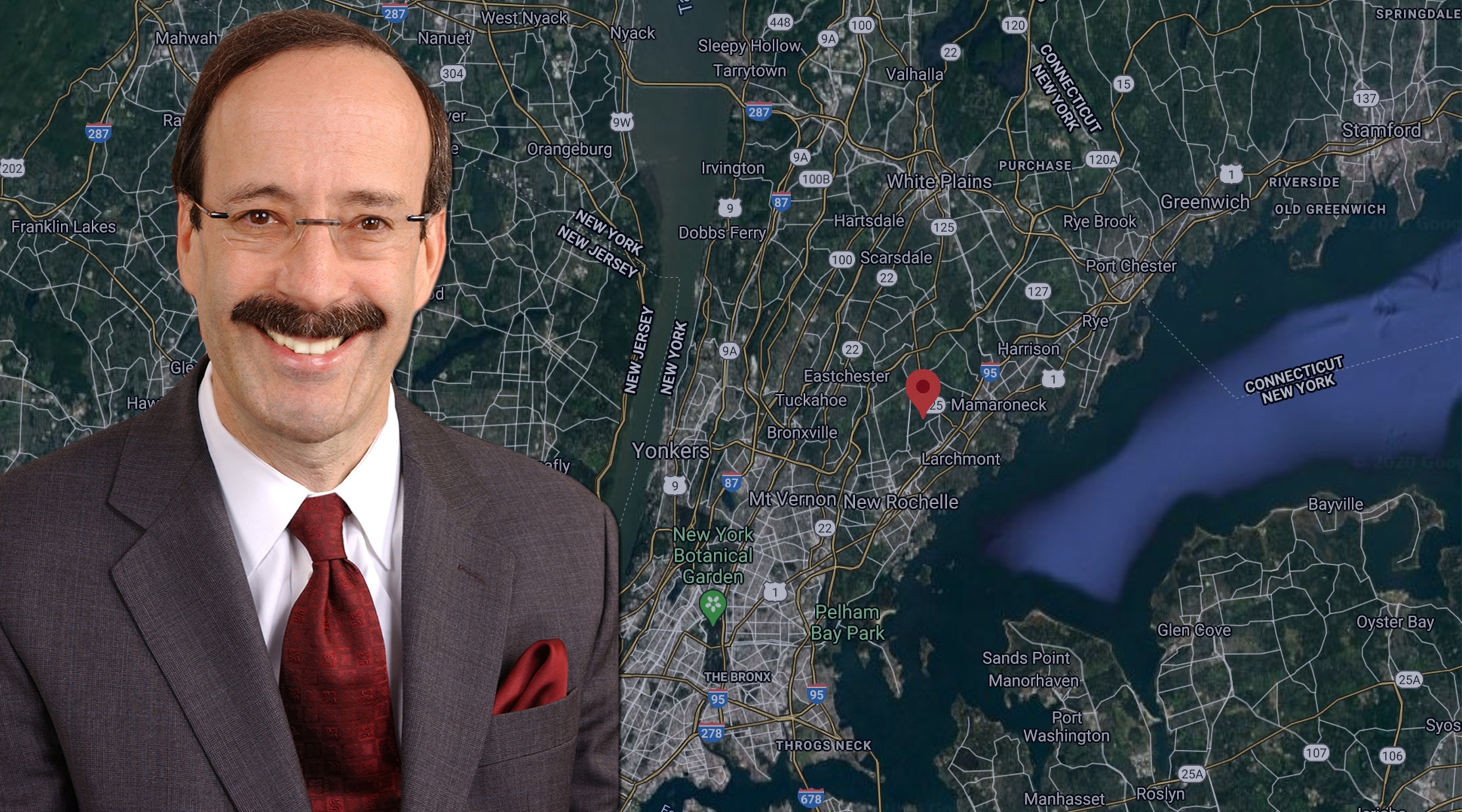WASHINGTON (JTA) — Here’s my completely beside-the-point thought on the latest political developments: Are we living through a weighty HBO political drama? Or a raunchy satirical take on Showtime?
That guy from Season 1 of “The Trump Years” — the one with the striking martial demeanor who, last we saw, was all but perp-walked out of the White House? He’s back just before the Season 4 wrap claiming victory.
Under Attorney General William Barr’s direction, the Department of Justice has directed prosecutors to drop the prosecution of Michael Flynn, the tough-talking general who was President Donald Trump’s first national security adviser. Flynn had sought to withdraw his guilty plea about lying to the FBI concerning conversations he had with Russia’s ambassador during the transition to the Trump presidency.
There’s plenty of noise about what happens next. Trump and his supporters are crying vindication, while the president’s detractors see Barr as corrupt and manipulating justice to favor Trump’s political fortunes. They note that Barr’s directive to drop charges was unprecedented in a case involving a guilty plea.
And in true last five minutes of the penultimate episode fashion, there was a twist: The judge in the case, Emmett Sullivan, is not ready to accept Barr’s recommendation on its face and wants to hear from those who see the move as political.
On Wednesday, Sullivan extraordinarily asked a former judge, John Gleeson, to essentially prosecute Flynn again. Earlier in the week, Gleeson had slammed Barr’s bid to exonerate Flynn as an abuse of power.
So as we head to November, and wonder whether the network will renew “The Trump Years” for another four seasons, it’s 2017 all over again. That first season was packed with subplots having plenty of Jewish and Middle East content, and those are likely to resurface. Here’s a review of some of the threads.
That U.N. resolution
Flynn lied to the FBI about two conversations with Russian Ambassador Sergei Kislyak during the transition in late 2016. One was to seek reassurances that the Russians would not counter with their own penalties against the Obama administration sanctions on Russia for interference in the 2016 election. The other was a plea to veto a U.N. resolution condemning Israel for its settlement expansion.
Flynn batted .500 here — yea on the sanctions request, nay on the veto, as the Security Council resolution went through because the Obama administration would not exercise its own veto. (U.N. Ambassador Samantha Power abstained, bringing the relationship between the Obama and Netanyahu governments to a sour end.)
The relitigation of Flynn’s case will surely return the Israel conversation to the forefront and what if anything Flynn offered Kislyak in exchange for the veto. Republicans already are casting Flynn’s outreach as laudable and pro-Israel.
“Keep in mind Obama admin was furious Gen Michael Flynn was making calls to world leaders helping to block UN Sec Council Res 2334 in Dec 16, which was an anti-Israel effort that should’ve been vetoed by the US, not fast tracked,” U.S. Rep. Lee Zeldin, a Jewish Republican from New York, said Thursday on Twitter. “Gen Flynn was doing exactly what needed to be done.”
Unmasking the unmaskers
Flynn also had an array of mysterious Middle East involvements, including one that could bring into the spotlight Trump’s son-in-law and senior adviser Jared Kushner. It’s a complex story, so stick with me.
This week Richard Grenell, the acting director of National Intelligence who is close to Trump, declassified a list of names of Obama administration officials who during the transition sought to “unmask” other officials talking with foreign nationals. That kind of info is tracked by the National Security Agency. “Unmasking” is an involved process requiring multiple levels of approval designed to protect U.S. citizens who converse with foreign nationals and might be targeted for eavesdropping.
Grenell’s declassifications related only to unmaskings that led to Flynn.
Why would Grenell unmask the unmaskings? The narrative among Trump supporters is that Obama officials leaked Flynn’s conversation with Kislyak to the media to sabotage Trump’s presidency. (Notably, Grenell delivered the information to Republican senators, not to their Democratic counterparts.)
But the declassified unmaskings likely had nothing to do with Flynn’s conversation with Kislyak. (Grenell has not declassified the underlying documents, just the requests.) Marcy Wheeler, a veteran spywatcher, points out that a number of the unmaskings predated the Kislyak conversations, and that in any case, a close reading of testimony shows that the FBI did not get its information about the Flynn-Kislyak conversations from the NSA but on its own.
So who was Flynn speaking to that would have merited an NSA tap? Wheeler notes that the timing of one of the unmaskings appears to be related to a secretive meeting during the transition of Flynn, Kushner and Mohammed bin Zayed, the crown prince of the United Arab Emirates. The meeting was secretive because, as Mother Jones’ Dan Friedman reports, the UAE ignored protocol and did not notify the Obama administration that it was taking place.
What was the meeting about? In 2017, Kushner said in congressional testimony that the Emiratis wanted to express their pleasure that Trump was signaling that he would be considerably tougher on Iran. Bin Zayed “was hopeful that strong American leadership in the Middle East would hopefully reverse what he saw as very detrimental to the Middle East — the last administration where a lot of our allies felt like America pulled back and lran was strengthened,” Kushner said.
Bin Zayed’s efforts in subsequent years to increase the UAE’s influence in Washington have engendered a number of scandals, including distributing millions to think tanks to garner influence.
Flynn also was lobbying for Turkey’s Erdogan government while he was campaigning for Trump, and allegedly contemplated kidnapping a U.S.-based enemy of the Turkish strongman. (Flynn denies the kidnapping plot.) Recep Tayyip Erdogan is notably not a friend of Israel, at times backing its deadly enemy in the Gaza Strip, Hamas, and pushing back against Israeli attempts to mine for gas in the Mediterranean Sea.
Why this matters leading to November
The reemergence of the Flynn case and the unmaskings will likely provide fodder for both parties ahead of the elections, and particularly in their Jewish campaigns. Republicans already are seeking to depict Flynn’s actions as favoring a pro-Israel agenda and contrast them with Obama’s record. Democrats will use the revelations to label Flynn and others high up in the Trump team — especially Kushner — as compromised through their association with shady regimes and characters. Kushner came across throughout the Russia investigation as hapless and naive, not a branding he wants as he leads efforts to guide America out of quarantine.
In Other News
Flipping California: Republicans have flipped a district in California for the first time in decades. It’s the 15th, where Mike Garcia, a former fighter pilot, bested Christy Smith, a state assemblywoman. Republicans are saying the win augurs good news for November, noting Garcia’s double-digit lead while Democrats are saying it’s a nothingburger — the Los Angeles-area seat was long Republican until 2018, when Democrat Katie Hill, who later resigned in a scandal, flipped it. (Roll Call considers what the race might or might not mean.) The Republican Jewish Coalition helped get out the vote for the special election.
“Not only did our PAC and supporters fundraise for him, but we used peer-to-peer texting to encourage Jewish Republican voters in the district to return their ballots,” Alex Siegel, the RJC’s deputy executive director and California regional director, tells me. “With mail-in ballots figuring to be much more prevalent in this November’s election, our use of this political technology will be a key outreach tool for us.”
King crowning himself: The RJC is spending money to oust U.S. Rep. Steve King, an Iowa Republican who has a long history of identification with white nationalist figures and themes. One recent RJC victory has been its role in the successful effort to have House Republicans declare King a pariah — he currently has no committee assignments.
But King is telling folks in his home state that House Minority Leader Kevin McCarthy of California is ready to “exonerate” him and put him back on committees. Not so fast, say folks close to the process. Rep. Steve Stivers of Ohio is on the GOP House Steering Committee, which decides committee placements, and he said on Twitter that King is still persona non grata. What I hear is that King may be spinning the normal process as exoneration: He and every other Republican will be up for committee placement when Congress reconvenes. That doesn’t mean he will be selected.
What did Jared say? Jared Kushner spoke to Time magazine and was asked about whether the federal elections on Nov. 3 might be moved because of the coronavirus pandemic. His answer, essentially, was that the decision was above his pay grade.
“It’s not my decision to make, so I’m not sure I can commit one way or the other,” Kushner said. “But right now, [Nov. 3 is] the plan, and again, hopefully, by the time we get to September, October, November, we’ve done enough work with testing and with all the different things we’re trying to do to prevent a future outbreak of the magnitude that would make us shut down again.”
That answer somehow was spun into headlines suggesting that the Trump administration was open to postponing the election. Kushner’s reply was inartful — he might have noted, as others have, that no single branch of government can postpone the election. But he was not suggesting a postponement. Reason magazine has a thorough takedown of the episode.
Blue Kumbaya: The Conference of Presidents of Major American Jewish Organizations wants you to know that all the nastiness surrounding its selection of a new chairperson, Dianne Lob, formally of HIAS, is a thing of the past.
“We commit ourselves, our organizations, and our community to working together with all of our fellow Americans, based on our shared commitment to democracy and our devotion to our country’s prosperity, to sustain each other in these troubled times as we banish bigotry from our midst,” said a statement this week signed by virtually every Presidents Conference member.
Maybe. Mort Klein, the president of the Zionist Organization of America, which signed the togetherness statement, was still litigating his case against Lob last week. Klein told the Jewish Journal of Los Angeles that Lob’s past leadership of HIAS makes her unfit for the job.
WORTH A LOOK
Where’s Eliot Engel? Not in his New York district, where for the first time in years he faces a credible primary challenge from the left. The Atlantic’s Edward-Isaac Dovere tracks the Jewish chairman of the House Foreign Affairs Committee to his Washington-area home, where Engel says the coronavirus has been keeping him close to the Capitol, making campaigning in his district a virtual affair.
TWEET SO SWEET
Elad Strohmayer, the spokesperson for Israel’s D.C. embassy, marks International Hummus Day (yes, it’s a thing) by inveighing against some of the recent “innovations” for the classic Middle Eastern dish. This may be the issue, more than any other, that unites Israel with its neighbors.
Stay In Touch
Share your thoughts on The Tell, or suggest a topic for us. Connect with Ron Kampeas on Twitter at @kampeas or email him at thetell@jta.org.
The Tell is a weekly roundup of the latest Jewish political news from Ron Kampeas, the Jewish Telegraphic Agency’s Washington Bureau Chief. Sign up here to receive The Tell in your inbox on Thursday evenings.
JTA has documented Jewish history in real-time for over a century. Keep our journalism strong by joining us in supporting independent, award-winning reporting.








